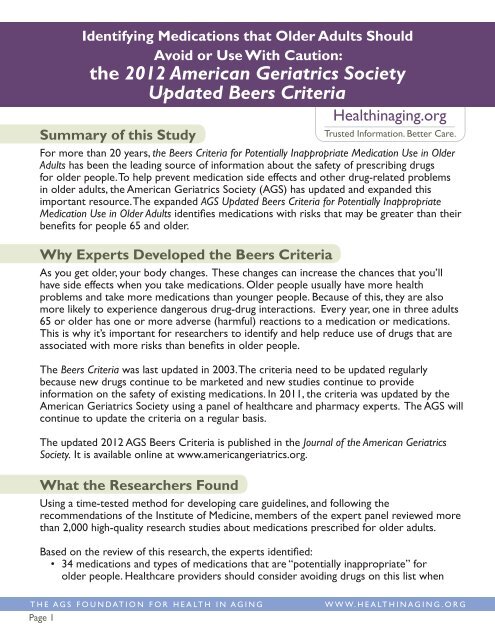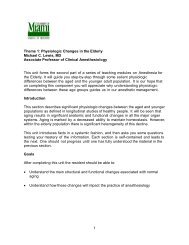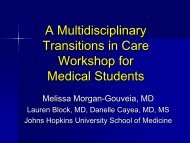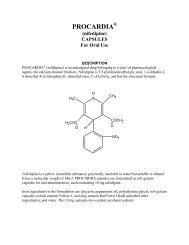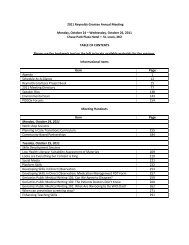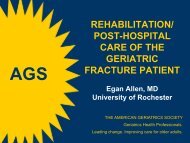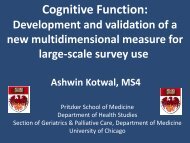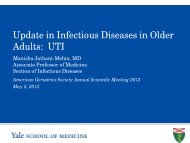Beers Criteria Public Translation - American Geriatrics Society
Beers Criteria Public Translation - American Geriatrics Society
Beers Criteria Public Translation - American Geriatrics Society
Create successful ePaper yourself
Turn your PDF publications into a flip-book with our unique Google optimized e-Paper software.
Identifying Medications that Older Adults Should<br />
Avoid or Use With Caution:<br />
the 2012 <strong>American</strong> <strong>Geriatrics</strong> <strong>Society</strong><br />
Updated <strong>Beers</strong> <strong>Criteria</strong><br />
Summary of this Study<br />
For more than 20 years, the <strong>Beers</strong> <strong>Criteria</strong> for Potentially Inappropriate Medication Use in Older<br />
Adults has been the leading source of information about the safety of prescribing drugs<br />
for older people. To help prevent medication side effects and other drug-related problems<br />
in older adults, the <strong>American</strong> <strong>Geriatrics</strong> <strong>Society</strong> (AGS) has updated and expanded this<br />
important resource. The expanded AGS Updated <strong>Beers</strong> <strong>Criteria</strong> for Potentially Inappropriate<br />
Medication Use in Older Adults identifies medications with risks that may be greater than their<br />
benefits for people 65 and older.<br />
Why Experts Developed the <strong>Beers</strong> <strong>Criteria</strong><br />
As you get older, your body changes. These changes can increase the chances that you’ll<br />
have side effects when you take medications. Older people usually have more health<br />
problems and take more medications than younger people. Because of this, they are also<br />
more likely to experience dangerous drug-drug interactions. Every year, one in three adults<br />
65 or older has one or more adverse (harmful) reactions to a medication or medications.<br />
This is why it’s important for researchers to identify and help reduce use of drugs that are<br />
associated with more risks than benefits in older people.<br />
The <strong>Beers</strong> <strong>Criteria</strong> was last updated in 2003. The criteria need to be updated regularly<br />
because new drugs continue to be marketed and new studies continue to provide<br />
information on the safety of existing medications. In 2011, the criteria was updated by the<br />
<strong>American</strong> <strong>Geriatrics</strong> <strong>Society</strong> using a panel of healthcare and pharmacy experts. The AGS will<br />
continue to update the criteria on a regular basis.<br />
The updated 2012 AGS <strong>Beers</strong> <strong>Criteria</strong> is published in the Journal of the <strong>American</strong> <strong>Geriatrics</strong><br />
<strong>Society</strong>. It is available online at www.americangeriatrics.org.<br />
What the Researchers Found<br />
Healthinaging.org<br />
Trusted Information. Better Care.<br />
Using a time-tested method for developing care guidelines, and following the<br />
recommendations of the Institute of Medicine, members of the expert panel reviewed more<br />
than 2,000 high-quality research studies about medications prescribed for older adults.<br />
Based on the review of this research, the experts identified:<br />
• 34 medications and types of medications that are “potentially inappropriate” for<br />
older people. Healthcare providers should consider avoiding drugs on this list when<br />
THE AGS FOUNDATION FOR HEALTH IN AGING<br />
Page 1<br />
WWW.HEALTHINAGING.ORG
prescribing for adults 65 or older. These medications pose a higher risk of side effects,<br />
may not work as well in an older person, and may be replaced with safer or more<br />
effective medications or non-drug remedies.<br />
• Medications used for 14 common health problems that are potentially inappropriate for<br />
older adults. Older adults often have other diseases or disorders in addition to these 14<br />
health problems that the medications may make worse.<br />
• 14 types of drugs that are potentially inappropriate and should be used only with<br />
caution in older adults. Drugs on this list may cause medication-related problems and<br />
may not be completely effective. However, they may be the best choice available for<br />
certain older patients. Healthcare providers need to carefully monitor how these drugs<br />
are working and keep an eye out for side effects. And older adults who take these<br />
medications, or their caregivers need to let their healthcare professionals know if these<br />
drugs don’t seem to be working, or appear to be causing side effects.<br />
How Health Professionals Are to Use this List<br />
Healthcare providers refer to the AGS <strong>Beers</strong> <strong>Criteria</strong> when deciding whether and what<br />
to prescribe for older adults, but should not make these decisions based only on the criteria.<br />
Among other reasons, they shouldn’t do this because the criteria don’t apply to all situations<br />
that older patients face. The criteria, for example, don’t take into account all of the unique<br />
circumstances of older people getting palliative or hospice care.<br />
Because the criteria shouldn’t dictate what healthcare providers prescribe, healthcare<br />
providers should not be penalized for prescribing a medication for an older person simply<br />
because it is on one of the criteria lists. Different older adults respond differently to the<br />
same medication, and, again, for some patients, drugs listed in the criteria will be the best<br />
choices.<br />
The criteria are also used in research, training, determining healthcare policy, developing<br />
insurance company policies regarding medication coverage, efforts to improve the quality of<br />
prescribing for older people, and the development of quality standards for drug therapy for<br />
older adults.<br />
What You Can Do<br />
To lower the chance of drug-related problems:<br />
• Keep a list of all of the medications you take—both non-prescription and prescription.<br />
This includes any supplements that you take, such as vitamins. You should also write<br />
down the doses, and bring it with you whenever you see a healthcare professional. This<br />
way, he or she will know what drugs and supplements you are taking and can check<br />
whether these might be causing side effects, or could cause side effects, if taken along<br />
with new medications.<br />
THE AGS FOUNDATION FOR HEALTH IN AGING<br />
Page 2<br />
WWW.HEALTHINAGING.ORG
• Ask if any of your medications are known to cause side effects. And if so, ask what<br />
they are—so you can watch for them. If you think you may be having a bad reaction to<br />
a drug, tell your healthcare professional. You should also speak with your healthcare<br />
provider if a drug you are taking appears in the 2012 AGS <strong>Beers</strong> <strong>Criteria</strong> and you are<br />
concerned that it may be causing side effects or other problems. You should not simply<br />
stop taking a medication because you think it may not be working or causing side<br />
effects, or because it is included in one of the three lists mentioned above. You should<br />
never stop taking medications without first checking with a healthcare<br />
professional.<br />
• Keep in mind that if a drug you take is on one of the lists in the AGS <strong>Beers</strong> <strong>Criteria</strong>, this<br />
does not necessarily mean that it poses greater risks than benefits for you. The way you<br />
respond to a medication or medications can differ from the way other people respond<br />
to it. This is why the experts who updated the criteria use the phrase “potentially<br />
inappropriate.” While the drugs on the lists may cause side effects in some older adults,<br />
they won’t necessarily cause these problems in all older people.<br />
AGS <strong>Beers</strong> <strong>Criteria</strong> for Potentially Inappropriate Medication Use in Older Adults<br />
Drugs and Categories of Why these drugs may be Recommendations<br />
Drugs<br />
inappropriate for older<br />
adults<br />
Anticholinergic drugs—these drugs can cause side effects such as confusion, hallucinations, sleepiness,<br />
blurred vision, difficulty urinating, dry mouth and constipation in older adults.<br />
Antihistamines—drugs that<br />
are typically prescribed for<br />
allergies, hives and eczema:<br />
• Brompheniramine<br />
• Carbinoxamine<br />
• Chlorpheniramine<br />
• Clemastine<br />
• Cyproheptadine<br />
• Dexbrompheniramine<br />
• Dexchlorpheniramine<br />
• Diphenhydramine (oral)<br />
• Doxylamine<br />
• Hydroxyzine<br />
• Promethazine<br />
• Triprolidine<br />
These drugs cause many<br />
side effects in older<br />
adults, including confusion,<br />
drowsiness, blurred vision,<br />
difficulty urinating, dry mouth<br />
and constipation. Safer<br />
medications are available.<br />
Avoid<br />
Use of diphenhydramine<br />
in special situations—such<br />
as for treating severe<br />
allergic reactions—may be<br />
appropriate.<br />
THE AGS FOUNDATION FOR HEALTH IN AGING<br />
Page 3<br />
WWW.HEALTHINAGING.ORG
AGS <strong>Beers</strong> <strong>Criteria</strong> for Potentially Inappropriate Medication Use in Older Adults<br />
Drugs and Categories of<br />
Drugs<br />
Why these drugs may be<br />
inappropriate for older<br />
Recommendations<br />
Antiparkinsonian drugs<br />
prescribed for Parkinson’s<br />
disease and other health<br />
problems:<br />
• Benztropine (oral)<br />
• Trihexyphenidyl<br />
Antispasmodic medications<br />
prescribed to relieve cramps<br />
or spasms:<br />
• Belladonna alkaloids<br />
• Clidinium-chlordiazepoxide<br />
• Dicyclomine<br />
• Hyoscyamine<br />
• Propantheline<br />
• Scopolamine<br />
adults<br />
There are other medications<br />
that are usually more<br />
effective for Parkinson’s<br />
disease and related disorders<br />
than these. The drugs should<br />
not be used for other<br />
conditions, like treating side<br />
effects of other medications<br />
(for example the movement<br />
side effects of antipsychotic<br />
medications).<br />
It’s is not clear whether<br />
these drugs are effective, but<br />
they have side effects.<br />
Avoid<br />
Avoid except if used in shortterm<br />
“comfort care.”<br />
Antithrombotics—these are medications to prevent or dissolve blood clots that can form inside blood<br />
vessels. These blood clots can be life-threatening.<br />
The short-acting form of<br />
Avoid<br />
Dipyridamole that is taken by<br />
mouth<br />
This form may make your<br />
blood pressure drop when<br />
you stand up. This can<br />
make you dizzy and may<br />
lead to dangerous falls.<br />
More effective alternatives<br />
are available. The form of<br />
dipyridamole that is injected,<br />
however, can be used during<br />
a heart “stress test.”<br />
Ticlopidine<br />
Safer, effective alternatives to<br />
this drug are available.<br />
Anti-infective drugs—such as antibiotics and antiviral drugs<br />
Nitrofurantoin, an antibacterial<br />
drug prescribed for urinary<br />
tract infections<br />
This drug may cause side<br />
effects that affect the lungs.<br />
Safer medications are<br />
available.<br />
Avoid<br />
Avoid long-term use and in<br />
patients with certain kidney<br />
problems.<br />
THE AGS FOUNDATION FOR HEALTH IN AGING<br />
Page 4<br />
WWW.HEALTHINAGING.ORG
AGS <strong>Beers</strong> <strong>Criteria</strong> for Potentially Inappropriate Medication Use in Older Adults<br />
Drugs and Categories of<br />
Drugs<br />
Why these drugs may be<br />
inappropriate for older<br />
adults<br />
Recommendations<br />
Cardiovascular drugs—for disorders that affect the heart and blood vessels.<br />
Alpha 1<br />
blockers—drugs for the These drugs can cause a<br />
prostate but also prescribed drop in blood pressure and<br />
for high blood pressure. dizziness when you stand<br />
• Doxazosin<br />
up. This can lead to falls.<br />
• Prazosin<br />
Alternative treatments<br />
• Terazosin<br />
provide better results with<br />
Medications, called Alpha<br />
agonists, which are prescribed<br />
for high blood pressure.<br />
• Clonidine<br />
• Guanabenz<br />
• Guanfacine<br />
• Methyldopa<br />
• Reserpine at doses greater<br />
than 0.1 milligrams daily<br />
Antiarrhythmic drugs<br />
prescribed for atrial fibrillation<br />
(irregular heart beat). (Class Ia,<br />
Ic, III)<br />
• Amiodarone<br />
• Dofetilide<br />
• Dronedarone<br />
• Flecainide<br />
• Ibutilide<br />
• Procainamide<br />
• Propafenone<br />
• Quinidine<br />
• Sotalol<br />
Disopyramide<br />
Dronedarone<br />
lower risks.<br />
These drugs may cause a<br />
slow heartbeat and dizziness.<br />
They are not recommended<br />
for routine treatment of high<br />
blood pressure.<br />
Other treatments may<br />
provide better results, or<br />
cause fewer side effects, or<br />
both.<br />
Amiodarone may contribute<br />
to thyroid, lung and heart<br />
problems.<br />
Disopyramide may increase<br />
risks of heart failure in<br />
older adults and may cause<br />
confusion, blurred vision,<br />
difficulty urinating, dry mouth<br />
and constipation. Safer<br />
medications are available.<br />
There are other drugs that<br />
provide better results in<br />
patients with atrial fibrillation<br />
(irregular heartbeat) or heart<br />
failure.<br />
Avoid using for high blood<br />
pressure.<br />
Clonidine should not be a<br />
first-choice treatment for<br />
high blood pressure.<br />
The other drugs on the list<br />
should be avoided.<br />
These drugs should not be<br />
the first choice for treating<br />
atrial fibrillation.<br />
Avoid<br />
Avoid in some patients with<br />
atrial fibrillation or heart<br />
failure.<br />
THE AGS FOUNDATION FOR HEALTH IN AGING<br />
Page 5<br />
WWW.HEALTHINAGING.ORG
AGS <strong>Beers</strong> <strong>Criteria</strong> for Potentially Inappropriate Medication Use in Older Adults<br />
Drugs and Categories of<br />
Drugs<br />
Why these drugs may be<br />
inappropriate for older<br />
Recommendations<br />
Digoxin at doses higher than<br />
0.125 milligrams per day<br />
Nifedipine, immediate release<br />
Spironolactone at doses higher<br />
than 25 milligrams daily<br />
Drugs affecting the brain and spinal cord<br />
Tertiary Tricyclic<br />
Antidepressants, alone or in<br />
combination:<br />
• Amitriptyline<br />
• Chlordiazepoxideamitriptyline<br />
• Clomipramine<br />
• Doxepin at doses of more<br />
than 6 milligrams per day.<br />
• Imipramine<br />
• Perphenazine-amitriptyline<br />
• Trimipramine<br />
All antipsychotic drugs<br />
Thioridazine<br />
Mesoridazine<br />
adults<br />
In older patients with heart<br />
failure, higher doses appear<br />
to offer no additional benefit<br />
and may increase risks<br />
of dangerous side effects.<br />
Older patients with kidney<br />
problems are at particular<br />
risk of side effects.<br />
This drug may lower blood<br />
pressure and could cause<br />
other heart problems.<br />
In people with heart failure,<br />
higher doses may boost risks<br />
of high potassium.<br />
Potential side effects include:<br />
confusion, drowsiness,<br />
blurred vision, difficulty<br />
urinating, dry mouth and<br />
constipation in older adults.<br />
They can also cause a drop in<br />
blood pressure and dizziness<br />
when you stand up. Safer<br />
medications are available.<br />
These drugs may increase<br />
risks of confusion, sleepiness,<br />
blurred vision, difficulty<br />
urinating, dry mouth,<br />
constipation, stroke, and<br />
death in people with<br />
dementia.<br />
These drugs may cause<br />
confusion, sleepiness, blurred<br />
vision, difficulty urinating,<br />
dry mouth and constipation.<br />
They may also increase risks<br />
of dangerous changes in<br />
heartbeat.<br />
Avoid<br />
Avoid<br />
Avoid higher doses in<br />
patients with heart failure or<br />
lower kidney function.<br />
Avoid<br />
Avoid using these drugs to<br />
treat behavioral problems in<br />
older people with memory<br />
disorders unless non-drug<br />
options haven’t worked and<br />
the patient is a threat to<br />
himself or herself or others.<br />
Avoid<br />
THE AGS FOUNDATION FOR HEALTH IN AGING<br />
Page 6<br />
WWW.HEALTHINAGING.ORG
AGS <strong>Beers</strong> <strong>Criteria</strong> for Potentially Inappropriate Medication Use in Older Adults<br />
Drugs and Categories of<br />
Drugs<br />
Why these drugs may be<br />
inappropriate for older<br />
Recommendations<br />
Barbiturates<br />
• Amobarbital<br />
• Butabarbital<br />
• Butalbital<br />
• Mephobarbital<br />
• Pentobarbital<br />
• Phenobarbital<br />
• Secobarbital<br />
Benzodiazepines<br />
Short- and intermediate-acting:<br />
• Alprazolam<br />
• Estazolam<br />
• Lorazepam<br />
• Oxazepam<br />
• Temazepam<br />
• Triazolam<br />
Long-acting:<br />
• Chlorazepate<br />
• Chlordiazepoxide<br />
• Chlordiazepoxideamitriptyline<br />
• Clidinium-chlordiazepoxide<br />
• Clonazepam<br />
• Diazepam<br />
• Flurazepam<br />
• Quazepam<br />
Chloral hydrate<br />
Meprobamate<br />
Nonbenzodiazepine hypnotics<br />
• Eszopiclone<br />
• Zolpidem<br />
• Zaleplon<br />
Ergot mesylates<br />
Isoxsuprine<br />
adults<br />
These medications can be<br />
addictive. Over time, they get<br />
less effective in helping older<br />
adults sleep. They are more<br />
likely to cause overdoses at<br />
lower doses than alternative<br />
drugs.<br />
Older adults are especially<br />
sensitive to these<br />
medications. These drugs<br />
may increase risks of mental<br />
decline, delirium, falls,<br />
fractures, and car accidents<br />
in older adults.<br />
Despite these risks, they may<br />
be appropriate, in certain<br />
cases, for treating seizures,<br />
certain sleep disorders,<br />
anxiety disorders, withdrawal<br />
from benzodiazepine drugs<br />
and alcohol, and end-of-life<br />
care.<br />
Not effective long-term, with<br />
high risk of overdose.<br />
This medication makes older<br />
adults sleepy and can be<br />
addictive.<br />
These medications may<br />
not significantly improve<br />
sleep and can cause many<br />
serious side effects, including<br />
confusion, falls, and bone<br />
fractures.<br />
These medications are not<br />
very effective.<br />
Avoid<br />
Avoid benzodiazepines<br />
(all types) when treating<br />
insomnia, agitation, or<br />
delirium (serious confusion<br />
that may have lasting effects).<br />
Avoid<br />
Avoid<br />
Avoid ongoing use of these<br />
drugs (over 90 days).<br />
Avoid<br />
THE AGS FOUNDATION FOR HEALTH IN AGING<br />
Page 7<br />
WWW.HEALTHINAGING.ORG
AGS <strong>Beers</strong> <strong>Criteria</strong> for Potentially Inappropriate Medication Use in Older Adults<br />
Drugs and Categories of Why these drugs may be Recommendations<br />
Drugs<br />
inappropriate for older<br />
adults<br />
Drugs and treatments for conditions affecting the glands that produce and secrete hormones, such<br />
as androgens (“male hormones”) and estrogen and progestins (“female hormones”)<br />
Androgens<br />
• Methyltestosterone<br />
• Testosterone<br />
Desiccated thyroid<br />
Estrogens with or without<br />
progestins<br />
These drugs may worsen<br />
heart problems and cause<br />
other side effects. They<br />
shouldn’t be prescribed for<br />
men with prostate cancer.<br />
Desiccated thyroid may not<br />
be appropriate for patients<br />
with a history of heart<br />
problems. Safer medications<br />
are available.<br />
These hormones may<br />
increase risks of breast<br />
cancer and cancer of the<br />
lining of the uterus. They<br />
don’t appear to help protect<br />
women from heart disease<br />
or loss of cognitive (thinking)<br />
ability in later life.<br />
Avoid using in men with<br />
prostate cancer. In other men,<br />
prescribe only for moderate<br />
to severe declines in natural<br />
testosterone production.<br />
Avoid<br />
Avoid pills and skin patches.<br />
Vaginal creams can be used<br />
at low doses to relieve pain<br />
during sex, and help prevent<br />
urinary tract infections, and<br />
related vaginal problems.<br />
Growth hormone<br />
Insulin, sliding scale<br />
Megestrol<br />
Estrogen cream inserted into<br />
the vagina does help vaginal<br />
dryness and is safe in women<br />
with breast cancer, especially<br />
if low doses are used.<br />
Growth hormone has many<br />
side effects, including joint<br />
pain, swelling, enlargement<br />
of breast tissue in men, and<br />
carpal tunnel syndrome. It<br />
may also increase the chance<br />
of getting diabetes.<br />
This way of dosing insulin is<br />
not very effective and can<br />
increase the chance of low<br />
blood sugar.<br />
This drug, prescribed to<br />
increase appetite, is not very<br />
effective, and may increase<br />
the chance of blood clots<br />
and, possibly, death.<br />
Avoid, except in patients who<br />
have had their pituitary gland<br />
removed for medical reasons.<br />
Avoid<br />
Avoid<br />
THE AGS FOUNDATION FOR HEALTH IN AGING<br />
Page 8<br />
WWW.HEALTHINAGING.ORG
AGS <strong>Beers</strong> <strong>Criteria</strong> for Potentially Inappropriate Medication Use in Older Adults<br />
Drugs and Categories of<br />
Drugs<br />
Why these drugs may be<br />
inappropriate for older<br />
Recommendations<br />
Sulfonylureas, long-duration<br />
• Chlorpropamide<br />
• Glyburide<br />
Medications for gastrointestinal problems<br />
Metoclopramide<br />
Mineral oil, taken by mouth<br />
Trimethobenzamide<br />
Pain Medications<br />
Meperidine<br />
adults<br />
Both medications can<br />
cause dangerous low<br />
blood sugar and other side<br />
effects in older adults. Safer<br />
medications are available.<br />
This medication may cause<br />
shakiness, sleepiness, and<br />
uncontrollable abnormal<br />
body movements. Frail older<br />
adults may be even more<br />
likely to get these effects.<br />
When swallowed, mineral oil<br />
may be accidentally inhaled<br />
and, as a result, can cause<br />
pneumonia. Safer medications<br />
are available.<br />
Not very effective for<br />
treating vomiting. This<br />
medication can cause side<br />
effects such as shakiness,<br />
sleepiness, and abnormal<br />
body movements.<br />
This is not a very effective<br />
pain reliever and may<br />
seizures. Safer medications<br />
are available.<br />
Avoid<br />
Avoid, except for<br />
gastroparesis, a condition<br />
that reduces the ability of<br />
the stomach to empty its<br />
contents.<br />
Avoid<br />
Avoid<br />
Avoid<br />
THE AGS FOUNDATION FOR HEALTH IN AGING<br />
Page 9<br />
WWW.HEALTHINAGING.ORG
AGS <strong>Beers</strong> <strong>Criteria</strong> for Potentially Inappropriate Medication Use in Older Adults<br />
Drugs and Categories of<br />
Drugs<br />
Why these drugs may be<br />
inappropriate for older<br />
Recommendations<br />
Non–COX-selective Non-<br />
Steroidal Anti-inflammatory<br />
Drugs (NSAIDs), oral<br />
• Aspirin at doses higher than<br />
325 milligrams per day<br />
• Diclofenac<br />
• Diflunisal<br />
• Etodolac<br />
• Fenoprofen<br />
• Ibuprofen<br />
• Ketoprofen<br />
• Meclofenamate<br />
• Mefenamic acid<br />
• Meloxicam<br />
• Nabumetone<br />
• Naproxen<br />
• Oxaprozin<br />
• Piroxicam<br />
• Sulindac<br />
• Tolmetin<br />
Indomethacin<br />
Ketorolac<br />
Pentazocine<br />
Skeletal muscle relaxants<br />
• Carisoprodol<br />
• Chlorzoxazone<br />
• Cyclobenzaprine<br />
• Metaxalone<br />
• Methocarbamol<br />
• Orphenadrine<br />
adults<br />
These medications increase<br />
the chance of stomach and<br />
intestinal bleeding in adults<br />
75 or older, and adults 65<br />
and older taking certain<br />
other medications (like<br />
prednisone warfarin, and<br />
clopidogrel) and medicines<br />
to prevent stroke.<br />
Taking a powerful stomach<br />
medication like a protonpump<br />
inhibitor (omeprazole)<br />
or misoprostol at the same<br />
time as these drugs lowers—<br />
but doesn’t eliminate—these<br />
risks.<br />
These drugs are NSAIDs<br />
that are even more likely<br />
to increase the chance<br />
of stomach and intestinal<br />
bleeding and ulcers or to<br />
cause other harmful effects.<br />
This pain reliever can cause<br />
confusion, hallucinations<br />
and other side effects. Safer<br />
medications are available.<br />
Most muscle relaxants have<br />
questionable effectiveness<br />
and can cause side effects<br />
such as sleepiness and<br />
increased risks of bone<br />
fractures in older people.<br />
Do not use these medications<br />
regularly unless there are no<br />
other effective alternatives<br />
and they are prescribed along<br />
with a proton-pump inhibitor<br />
or misoprostol.<br />
Avoid<br />
Avoid<br />
Avoid<br />
THE AGS FOUNDATION FOR HEALTH IN AGING<br />
Page 10<br />
WWW.HEALTHINAGING.ORG
AGS <strong>Beers</strong> <strong>Criteria</strong> for Potentially Inappropriate Medication Use in Older Adults<br />
Disease or<br />
Syndrome<br />
Drug(s) Rationale Recommendation<br />
Heart failure • Nonsteroidal<br />
antinflammatory drugs<br />
(NSAIDs) and COX-2<br />
inhibitors (see above list for<br />
examples)<br />
These drugs may increase<br />
the chance of fluid retention,<br />
and contribute to heart<br />
failure.<br />
Avoid<br />
Pioglitazone, rosiglitazone<br />
Cilostazol<br />
Dronedarone<br />
Syncope or<br />
fainting<br />
Chronic<br />
seizures or<br />
epilepsy<br />
If the heart failure is systolic<br />
heart failure:<br />
• Diltiazem<br />
• Verapamil<br />
Acetylcholinesterase inhibitors<br />
• Donepezil<br />
• Galantamine<br />
• Rivastigmine<br />
Peripheral alpha blockers<br />
• Doxazosin<br />
• Prazosin<br />
• Terazosin<br />
Tertiary Tricyclic<br />
Antidepressants<br />
(TCAs): Amitriptyline,<br />
chlordiazepoxide-amitriptyline,<br />
clomipramine, doxepin,<br />
imipramine, perphenazineamitriptyline,<br />
trimipramine<br />
Chlorpromazine, thioridazine,<br />
and olanzapine<br />
Bupropion<br />
Chlorpromazine<br />
Clozapine<br />
Maprotiline<br />
Olanzapine<br />
Thioridazine<br />
Thiothixene<br />
Tramadol<br />
These drugs increase the<br />
chance of dizziness, fainting,<br />
and falling, and may cause a<br />
slowed heartbeat.<br />
These medications may<br />
increase the frequency of<br />
seizures in some older<br />
adults. But they may be<br />
acceptable in older patients<br />
with well-controlled seizures<br />
and for whom other drugs<br />
have not been effective.<br />
Avoid<br />
Avoid unless<br />
seizures are well<br />
controlled and<br />
other drugs do<br />
not work.<br />
THE AGS FOUNDATION FOR HEALTH IN AGING<br />
Page 11<br />
WWW.HEALTHINAGING.ORG
AGS <strong>Beers</strong> <strong>Criteria</strong> for Potentially Inappropriate Medication Use in Older Adults<br />
Disease or<br />
Syndrome<br />
Drug(s) Rationale Recommendation<br />
Delirium All Tricyclic Antidepressants<br />
(TCAs)<br />
All Anticholinergic drugs<br />
Benzodiazepines<br />
Chlorpromazine<br />
Corticosteroids<br />
H 2<br />
-receptor antagonist<br />
Meperidine<br />
Sedative hypnotics<br />
Thioridazine<br />
These medications can<br />
cause or worsen delirium in<br />
older people. Avoid these<br />
drugs in older adults with or<br />
at high risk of delirium.<br />
Avoid<br />
Dementia<br />
and<br />
cognitive/<br />
mental<br />
impairment<br />
A history<br />
of falls or<br />
fractures<br />
Anticholinergic drugs<br />
Benzodiazepines<br />
H 2<br />
-receptor antagonists<br />
Zolpidem<br />
Antipsychotics—used<br />
regularly or as needed<br />
Anticonvulsants<br />
Antipsychotics<br />
Benzodiazepines<br />
Nonbenzodiazepine hypnotics<br />
• Eszopiclone<br />
• Zaleplon<br />
• Zolpidem<br />
Tricyclic Antidepressants<br />
(TCAs) and Selective<br />
Serotonin Uptake Inhibitors<br />
(SSRIs)<br />
Avoid these drugs in adults<br />
with cognitive or “thinking”<br />
problems because these<br />
medications may make this<br />
worse.<br />
Antipsychotic drugs should<br />
not be prescribed for<br />
behavioral problems related<br />
to dementia unless non-drug<br />
or safer drug options are<br />
not working and a patient<br />
is a threat to himself or<br />
others. Antipsychotic drugs<br />
may increase the chance of<br />
stroke and death in people<br />
with dementia.<br />
These drugs can cause<br />
fainting and falls, and make<br />
it hard to coordinate<br />
movements.<br />
Avoid<br />
Avoid<br />
unless safer<br />
medications<br />
are not<br />
available. Avoid<br />
anticonvulsant<br />
drugs in<br />
someone with a<br />
history of falls/<br />
fractures unless<br />
it is for seizures.<br />
THE AGS FOUNDATION FOR HEALTH IN AGING<br />
Page 12<br />
WWW.HEALTHINAGING.ORG
AGS <strong>Beers</strong> <strong>Criteria</strong> for Potentially Inappropriate Medication Use in Older Adults<br />
Disease or<br />
Syndrome<br />
Drug(s) Rationale Recommendation<br />
Insomnia Oral decongestants<br />
• Pseudoephedrine<br />
• Phenylephrine<br />
Stimulants<br />
• Amphetamine<br />
• Methylphenidate<br />
• Pemoline<br />
Other medications<br />
• Theophylline<br />
• Caffeine<br />
These drugs make insomnia<br />
worse.<br />
Avoid<br />
Parkinson’s<br />
disease<br />
Chronic<br />
constipation<br />
All antipsychotics except<br />
quetiapine and clozapine<br />
Antiemetics<br />
• Metoclopramide<br />
• Prochlorperazine<br />
• Promethazine<br />
Oral medications for urinary<br />
incontinence<br />
• Darifenacin<br />
• Fesoterodine<br />
• Oxybutynin<br />
• Solifenacin<br />
• Tolterodine<br />
• Trospium<br />
Antihistamines<br />
• Brompheniramine (various)<br />
• Carbinoxamine<br />
• Chlorpheniramine<br />
• Clemastine (various kinds)<br />
• Cyproheptadine<br />
• Dexbrompheniramine<br />
• Dexchlorpheniramine<br />
(various kinds)<br />
• Diphenhydramine<br />
• Doxylamine<br />
• Hydroxyzine<br />
• Promethazine<br />
• Triprolidine<br />
These drugs may worsen<br />
symptoms of Parkinson’s<br />
disease and/or cause<br />
Parkinson’s-like symptoms<br />
Quetiapine and clozapine<br />
appear to be less likely<br />
to worsen symptoms of<br />
Parkinson’s disease than the<br />
other drugs listed here.<br />
The medications can worsen<br />
constipation and safer<br />
medications are available.<br />
Avoid<br />
Avoid unless<br />
no other<br />
alternatives are<br />
available.<br />
THE AGS FOUNDATION FOR HEALTH IN AGING<br />
Page 13<br />
WWW.HEALTHINAGING.ORG
AGS <strong>Beers</strong> <strong>Criteria</strong> for Potentially Inappropriate Medication Use in Older Adults<br />
Disease or<br />
Syndrome<br />
Drug(s) Rationale Recommendation<br />
Chronic<br />
constipation<br />
(cont’d)<br />
The medications can worsen<br />
constipation and safer<br />
medications are available.<br />
Heart/blood pressure<br />
medications<br />
• Diltiazem<br />
• Verapamil<br />
Avoid unless<br />
no other<br />
alternatives are<br />
available.<br />
Repeated<br />
stomach or<br />
intestinal<br />
ulcers<br />
Poor kidney<br />
function<br />
Urinary<br />
incontinence<br />
(accidental<br />
loss of<br />
urine) in<br />
women<br />
Other medications<br />
• Antipsychotics<br />
• Belladonna alkaloids<br />
• Clidinium-chlordiazepoxide<br />
• Dicyclomine<br />
• Hyoscyamine<br />
• Propantheline<br />
• Scopolamine<br />
• Tertiary Tricyclic<br />
Antidepressants<br />
(amitriptyline, clomipramine,<br />
doxepin, imipramine, and<br />
trimipramine)<br />
Aspirin at doses higher than<br />
325 milligrams per day<br />
Non–COX-2 selective<br />
NSAIDs<br />
Nonsteroidal antiinflammatory<br />
drugs<br />
Triamterene (alone or in<br />
combination with other<br />
medications)<br />
Estrogen in pill or patch form<br />
(but not estrogen cream<br />
inserted into the vagina)<br />
These drugs may make<br />
ulcers worse and increase<br />
the chance of new ulcers.<br />
These drugs may increase<br />
risks of potentially serious<br />
kidney damage.<br />
Estrogen in pill or patch<br />
form can make urinary<br />
incontinence worse in<br />
women.<br />
Avoid<br />
these drugs<br />
unless other<br />
medications are<br />
not effective<br />
and the patient<br />
can take an<br />
accompanying<br />
medication that<br />
can help prevent<br />
ulcers—such as<br />
a proton-pump<br />
inhibitor or<br />
misoprostol.<br />
Avoid<br />
Avoid in women.<br />
THE AGS FOUNDATION FOR HEALTH IN AGING<br />
Page 14<br />
WWW.HEALTHINAGING.ORG
AGS <strong>Beers</strong> <strong>Criteria</strong> for Potentially Inappropriate Medication Use in Older Adults<br />
Disease or<br />
Syndrome<br />
Drug(s) Rationale Recommendation<br />
Prostate Ipratropium inhaler<br />
These medications may Avoid in men.<br />
enlargement Tiotropium inhaler<br />
or urinary<br />
problems in<br />
cause aggravated prostate<br />
problems and make<br />
urination more difficult.<br />
men<br />
Stress or<br />
mixed<br />
urinary<br />
incontinence<br />
(loss of<br />
urine when<br />
sneezing/<br />
coughing/<br />
bending<br />
over/with<br />
exercise)<br />
Alpha-blockers<br />
• Doxazosin<br />
• Prazosin<br />
• Terazosin<br />
These may make bladdercontrol<br />
problems worse<br />
Avoid in women.<br />
THE AGS FOUNDATION FOR HEALTH IN AGING<br />
Page 15<br />
WWW.HEALTHINAGING.ORG
2012 AGS <strong>Beers</strong> <strong>Criteria</strong> for Potentially Inappropriate Medications to Be Used with<br />
Caution in Older Adults<br />
Drug(s) Rationale Recommendation<br />
Aspirin to prevent heart attacks<br />
and other “cardiac events”<br />
Dabigatran<br />
Prasugrel<br />
Antipsychotics<br />
Carbamazepine<br />
Carboplatin<br />
Cisplatin<br />
All antidepressants<br />
Vincristine<br />
Vasodilators<br />
In adults 80-years-old and<br />
older, aspirin may do more<br />
harm than good<br />
This medication, used to<br />
prevent the formation of<br />
blood clots in patients with<br />
atrial fibrillation, increases the<br />
chance of bleeding in adults<br />
75 years and older more than<br />
another drug, warfarin, that is<br />
used for the same purpose.<br />
There isn’t enough evidence<br />
that dabigatran is effective and<br />
safe in patients with kidney<br />
problems.<br />
This drug can increase the<br />
chance of bleeding in older<br />
adults, but may be appropriate<br />
for some older adults at<br />
very high risk of future heart<br />
problems.<br />
These drugs may lower<br />
your blood sodium level to<br />
dangerous levels. Healthcare<br />
providers should monitor<br />
patients taking these<br />
medications.<br />
These drugs may increase<br />
risks of fainting in older adults<br />
with a history of fainting.<br />
Use aspirin with caution<br />
in adults 80 and older.<br />
Use this drug with<br />
caution in adults 75<br />
and in older adults with<br />
kidney problems.<br />
Use with caution in<br />
adults 75 years or older.<br />
Use with caution.<br />
Use with caution.<br />
This summary is from the full report titled, AGS Updated <strong>Beers</strong> <strong>Criteria</strong> for Potentially<br />
Inappropriate Medication Use in Older Adults. It is in the March 2012 issue of the Journal of the<br />
<strong>American</strong> <strong>Geriatrics</strong> <strong>Society</strong> (JAGS). The report is authored by the <strong>American</strong> <strong>Geriatrics</strong> <strong>Society</strong><br />
2012 <strong>Beers</strong> <strong>Criteria</strong> Update Expert Panel.<br />
The <strong>American</strong> <strong>Geriatrics</strong> <strong>Society</strong> gratefully acknowledges the support of Bristol-Meyers Squibb,<br />
the John A. Hartford Foundation, Retirement Research Foundation and Robert Wood Johnson<br />
Foundation.<br />
Healthinaging.org<br />
Trusted Information. Better Care.<br />
THE AMERICAN GERIATRICS SOCIETY FOUNDATION FOR HEALTH IN AGING<br />
Page 16


